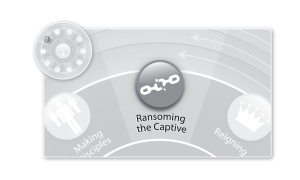Part II of our series on Ransoming the Captive
 We launched a new series this week on Ransoming the Captive and concluded by asking readers to share their thoughts on what it looks like for a church or an individual to ransom captives today. What does it look like to do this Work of Mercy in our time?
We launched a new series this week on Ransoming the Captive and concluded by asking readers to share their thoughts on what it looks like for a church or an individual to ransom captives today. What does it look like to do this Work of Mercy in our time?
Well, on March 8, 2009, a new church was born in Sioux Falls, South Dakota. The local newspaper headline from just a few months later read:
The name of the new congregation was The Ransom Church, and it listed the following mission and vision on its website:
Our Mission:
We exist to set captives free…Period.…
Our Vision:
We believe God’s vision for us is to spread the truth of Jesus Christ through Sioux Falls. God has called us to set captives free. We want to leave no corner of this city untouched in living out this vision.
Now that’s a Scriptural mission!
In fact, as we’ll see all throughout this month, few missions or visions or congregational names are as Scriptural as the mission of ransoming captives. And when we understand how Christ has ransomed us, we’ll come to understand why even more deeply.
Unfortunately, though, the newspaper report and the website for The Ransom Church do not go on to detail a literal ransoming of literal captives, with members giving themselves up to imprisonment in order to ransom others. If the early church had a website, it would have talked a lot about that kind of ransoming. We know this, because it’s a subject that pops up in many letters and stories and reports by and about the early church.
It was one of the things that amazed people about Christians.
You can see it in Clement’s letter to the church in Corinth, sent around the start of the second century AD. Clement wrote:
We know that many have given themselves up to imprisonment in order to ransom others; many too have delivered themselves into slavery and have fed others with the sale price
(1 Clement 55:2)
Did you catch that? Many. As in, “Many Christians have ransomed others by delivering themselves into slavery.”
And it was hardly a one-time thing: On through the Middle Ages, Christians continued to deliver themselves into slavery in Jesus’ name in order to set others free. In fact, several groups in the medieval church like the Trinitarians and the Mercedarians even set aside a third of their income to ransom church members who were taken captive.
Well, today, there are more Christians being held captive than ever before. In fact, there are 200 million Christians in 60 countries who are persecuted, tortured, and imprisoned simply for being Christian.
That’s a lot of ransoming to do!
Unfortunately, though, we don’t read the Scriptures very literally anymore. We don’t personally know a lot of Christians who are in prison. And we’ve forgotten 1800 years of church practice and instead we think of ransoming the captive as something figurative, or symbolic…which is what the pastor of the Ransom Church of Sioux Falls, South Dakota told the newspaper reporter when the reporter asked, “So what does it mean to ransom captives?”
“We’re all captive to something,” the pastor said. “Greed, guilt, abuse, past failures, money.”
So before Christmas, The Ransom Church leadership team delivered 2,000 Christmas bags door-to-door to homes around Sioux Falls. Those bags were stuffed with ribbon, tape and holiday gift tags in addition to flyers about The Ransom Church.
The church also held events in November and January at a gas station, sponsoring a 50 cent -per-gallon discount on gas. The pastor said, “We pumped gas, met people and had a commitment not to accept any donations. For the leadership team, it was about introducing ourselves, meeting people and serving free of self.”
Those are all very good things. And it’s true that greed, guilt, and abuse can be like captivity. But this is all quite a bit different than what Ransom Church’s ancestors—Christians across eighteen centuries—meant by ransoming the captives in Jesus’ name. For example, as a chronicler of the Mercedarian Order wrote:
An Irish saint by the name of Saint Serapion was enrolled as a soldier in Richard the Lion Heart’s Army… He redeemed many captives and on one particular occasion gave himself as hostage to ransom Christian prisoners, who were on the verge of betraying their Faith.
His Mercedarian friend traveled swiftly to Spain, collected the money for the ransom and returned to save Serapion.
Unfortunately, the friend did not return in time and the Algerian King, Selin Benimarin, nailed Saint Serapion onto a Saint Andrew’s cross… Similarly, Saint Peter Armengol gave himself in exchange for a captive in Morocco. Once again the ransom money did not arrive in time and Saint Peter was hung. The Blessed Virgin miraculously intervened and although Peter remained with a twisted neck for the rest of his life, his life was spared. Peter died in seclusion in the Convent of Santa Maria dels Prats, in 1304.
Giving a 50 cent per gallon discount on gas is a good way to be nice to people.
But willingly entering into crucifixion, hanging, or neck twisting in order to ransom a captive brother or sister—that is not about being nice.
It’s about mirroring the character of Christ to the world.
And we have to figure out what that means today. In other words, is ransoming the captive just a figure of speech for us? Or does God intend for it to be something more?
What do you think?












Pingback: Myth: Jesus Came to Pay The Ransom for All People | Rev. Eric Foley
Pingback: Really Amazed « Afflicted 4 Christ